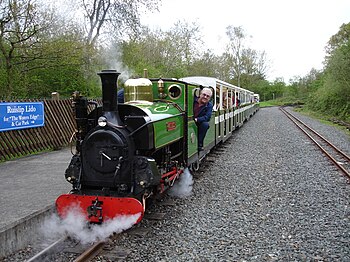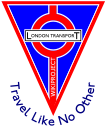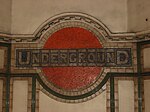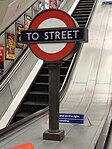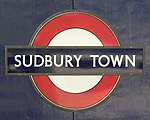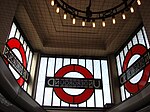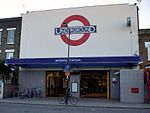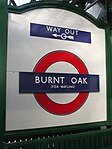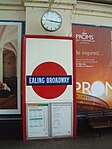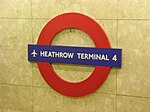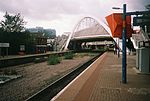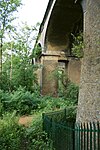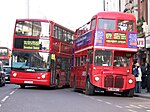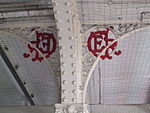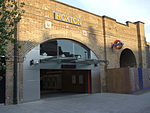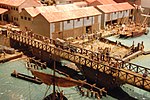User talk:Alarics/Archive 2010
| This is an archive of past discussions with User:Alarics. Do not edit the contents of this page. If you wish to start a new discussion or revive an old one, please do so on the current talk page. |
| Archive 2005 | ← | Archive 2008 | Archive 2009 | Archive 2010 | Archive 2011 | Archive 2012 |
Caning in Singapore schools
Please stop re-adding unsourced allegations to articles on schools and organizations, as you did here. If you're going to add a serious allegation such as that an organization beats students in front of their peers, a reliable source is needed. Fran Rogers (talk) 00:52, 22 December 2009 (UTC)
- In fact, that's not a "serious allegation" for a Singapore boys' school, or even an "allegation" at all, merely a neutral statement of fact; it's just perfectly normal, legal and accepted. I can see that you are coming at this from another cultural perspective where assumptions are different. (see WP:WORLDVIEW).
- It is the norm for WP articles about schools not to require every single fact to cite a source unless someone challenges it ("Sources should be cited when adding material that is challenged or likely to be challenged" per WP:CITE). There are many thousands of examples of that, and if you are going to delete every such item from all schools articles in the world, you have a busy time ahead! In the present example, nobody in Singapore familiar with the subject would challenge it, because it's true. I know that that particular page has been frequented by students of the school in question and they would have certainly have changed anything that wasn't true. Anyway, someone else has now removed the paragraph in question (and much else besides), and the school doesn't have its handbook on line and I can't find a reliable source for the moment, only anecdotal sources like blogs, so we shall have to leave it there. -- Alarics (talk) 09:17, 22 December 2009 (UTC)
- The spirit and letter of the verifiability and no original research policies is that all content in an article must ultimately be based upon a reliable source. Material "likely to be challenged" is further expected to have an inline quotation so that readers can easily verify it for themselves, but ultimately everything in an article should be based upon one of that article's sources. As WP:NOR states, "Wikipedia is not the place to publish your own opinions, experiences, arguments, or conclusions." (And if corporal punishment in front of one's peers - as opposed to in private - is the norm in Singapore, why is the public nature being pointed out in the sentence, when I'd think it would be assumed?) Fran Rogers (talk) 00:14, 23 December 2009 (UTC)
- Because not all Singapore schools cane in public. Some do it only in private. Most do both. It's not that public caning is "the norm" -- it tends in most schools to be the exception, i.e. typically only a few times a year, for particularly serious cases -- simply that there is nothing wrong or especially odd about it, so it cannot be called an "allegation". -- Alarics (talk) 07:35, 23 December 2009 (UTC)
If this is really the case then you need a reliable source to back this up. You can't rely on your own experience. Monkeyassault (talk) 12:18, 2 April 2010 (UTC)
- Hi, I would just like to point out the fact that as a citizen and student in the abovementioned country, I have not heard of a single verifiable case of caning in a school. While I am sure at least one instance of it has occurred somewhere and some point in time, I personally have not come across an occurrence of such. I belive citing sources would be an excellent idea. Thanks. AngChenrui (talk) 14:56, 21 June 2010 (UTC)
- Actually it occurs every day! If you don't have any connection with schools or students there is no particular reason why you personally would have heard of a "verifiable case". Of course, it is not usually reported in the newspapers because it is routine. However, I will find you one or two cases that have been reported. Alarics (talk) 15:06, 21 June 2010 (UTC)
- I'm still schooling, so it makes it rather mystifying. Perhaps the school of mine has remonstrated the use of the cane. But yep, it would be great to see the cases - you'll include in the various school articles as references I believe? Oh and also, are you a Singaporean? Thanks. AngChenrui (talk) 15:19, 21 June 2010 (UTC)
- Which school are you attending? There are a few which do not use the cane. The majority of secondary schools do, in widely varying amounts (except for girls-only schools, obviously). Anyway, I have added news citations for several cases in a new paragraph at the end of Caning in Singapore#School caning. Often the news report doesn't name the school, so these references in many cases cannot be added to the WP article for the relevant school. What one can put into the individual school article is reference to their handbooks where these are on line, and this has been done in a number of instances. Naturally, these don't refer to individual specific cases, only to the fact that caning is one of the discipline options. No, I'm not a Singaporean but I know Singapore quite well. Alarics (talk) 15:50, 21 June 2010 (UTC)
AfD nomination of Michael P. Fay

An editor has nominated one or more articles which you have created or worked on, for deletion. The nominated article is Michael P. Fay. We appreciate your contributions, but the nominator doesn't believe that the article satisfies Wikipedia's criteria for inclusion and has explained why in his/her nomination (see also Wikipedia:Notability and "What Wikipedia is not").
Your opinions on whether the article meets inclusion criteria and what should be done with the article are welcome; please participate in the discussion(s) by adding your comments to Wikipedia:Articles for deletion/Michael P. Fay. Please be sure to sign your comments with four tildes (~~~~).
You may also edit the article during the discussion to improve it but should not remove the articles for deletion template from the top of the article; such removal will not end the deletion debate.
Please note: This is an automatic notification by a bot. I have nothing to do with this article or the deletion nomination, and can't do anything about it. --Erwin85Bot (talk) 01:09, 14 April 2010 (UTC)
May + June Metro
| The Metropolitan | |||||||||||||||||||||||
|---|---|---|---|---|---|---|---|---|---|---|---|---|---|---|---|---|---|---|---|---|---|---|---|
| |||||||||||||||||||||||
. Only just released! Simply south (talk) 20:09, 3 June 2010 (UTC)
Oops
I owe you an apology, Alarics - somehow, I did not see your version, which I agree is well-balanced, neutral and in general very good. Rather, I saw cenwin88lee's version, where amnesty international is characterised as "berating" Singapore, among other points of contention. I think there must have been a delay between the submission of my edit and its actually being committed to the database (?). --?_? node.ue ?_? (talk) 07:54, 14 June 2010 (UTC)
- I clearly misunderstood your intentions and I apologise for losing my temper. Alarics (talk) 08:22, 14 June 2010 (UTC)
RfC on User:Cenwin88lee
Hi Alarics,
I've just started an RfC on the recent conduct of User:Cenwin88lee. Your input would be much appreciated: Wikipedia:Requests_for_comment/Cenwin88lee. --?_? node.ue ?_? (talk) 21:13, 15 June 2010 (UTC)
You are now a Reviewer

Hello. Your account has been granted the "reviewer" userright, allowing you to review other users' edits on certain flagged pages. Pending changes, also known as flagged protection, is currently undergoing a two-month trial scheduled to end 15 August 2010.
Reviewers can review edits made by users who are not autoconfirmed to articles placed under pending changes. Pending changes is applied to only a small number of articles, similarly to how semi-protection is applied but in a more controlled way for the trial. The list of articles with pending changes awaiting review is located at Special:OldReviewedPages.
When reviewing, edits should be accepted if they are not obvious vandalism or BLP violations, and not clearly problematic in light of the reason given for protection (see Wikipedia:Reviewing process). More detailed documentation and guidelines can be found here.
If you do not want this userright, you may ask any administrator to remove it for you at any time. Courcelles (talk) 02:32, 18 June 2010 (UTC)
Insufficient info for Railway Mag ref
Have just fixed this one for you; do you have any more like that? I have a near-complete run of The Railway Magazine from January 1935 to date, with only 5 missing: Jan 1936, May 1937, Sep 1937, May 1940 and Oct 1940. --Redrose64 (talk) 19:11, 20 June 2010 (UTC)
- I'm very impressed! That would be a fantastic source for squillions of missing references in hundreds of railway articles on WP. An awful lot of work, though.
- By the way, I don't think Railway Magazine is a "journal" in the WP sense. I'd use "cite news". I think "cite journal" is for scholarly academic papers. Alarics (talk) 19:48, 20 June 2010 (UTC)
- It's a magazine, and
{{cite magazine}}redirects to{{cite journal}}. Further,{{cite journal}}has a number of features which{{cite news}}lacks: these include parameters for the editor's name (many magazine articles have no author, but the editor is normally given); month and year (few magazines have a full cover date, and I have noticed problems when an incomplete date is put into the|date=parameter of a citation template); volume and issue number. --Redrose64 (talk) 21:28, 20 June 2010 (UTC)- Well, in that case I would at least leave the "publisher" field blank (we don't need to keep being told that Railway Magazine is published by IPC blah blah), and I also doubt the utility in such a case of volume and issue number. Such magazines have a cover date consisting of the month and year, which always works OK for me in "cite news". Also, where the author name is given -- or, really, even when it isn't -- I don't think the name of the magazine's editor is of value, any more than we would think it relevant to name the editor of The Guardian when citing an item in that paper. Alarics (talk) 21:46, 20 June 2010 (UTC)
- Putting a month and year into
|date=will give a satisfactory visual appearance, but it's what goes on behind the scenes that's the problem. I have encountered problems when linking Harvard-style short note references;|date=March 2009will sometimes give a valid link, but sometimes won't, whereas|month=March|year=2009always generates a working link. - The other thing is in the COinS metadata which these templates export (they do it in
{{citation/core}}, and see also http://ocoins.info ), which allows automated tools to parse the citation information. Go to a Wikipedia rticle which contains a{{cite book}},{{cite journal}}etc. View the page source and look for something beginning "Z3988": this is the COinS metadata. Since each item in the metadata has a designated purpose, it's best to use the citation template parameters purely for their intended purposes. It's also better to pass too much than too little, so that the exact magazine and article may be identified - some libraries have their back issues bound into annual volumes; if they index by volume and issue, including such information is beneficial. --Redrose64 (talk) 23:02, 20 June 2010 (UTC)- We shall have to agree to differ about this. I shall go on using "cite news" for factual refs in popular monthly magazines, which are not at all on a par with learned journals and where month and year seems entirely sufficient to identify the issue concerned. "Cite journal" produces a lot of pointless clutter, unlikely to be appreciated or even understood by the lay reader. Alarics (talk) 23:12, 20 June 2010 (UTC)
- Also, isn't it rather putting the cart before the horse to choose which template to use on the basis of what happens behind the scenes with the COinS metadata? If the COinS doesn't do what it is supposed to do, maybe somebody should fix it. It ought not to affect what the reader sees.Alarics (talk) 08:39, 22 June 2010 (UTC)
- It's not necessarily the incorrect choice of template that creates bad COinS metadata (the COinS author comes from the template author, whichever template is used), but putting inappropriate data into template fields not intended for it; for example, an editor shouldn't be passed via the author. See User:Citation bot/bugs for some of the problems that occur when other websites put data into improper metadata fields.
- COinS aside, I've raised a thread at WT:CITET#Magazines, to which you are invited to comment. --Redrose64 (talk) 13:31, 22 June 2010 (UTC)
- Why would using "cite news" for a popular magazine article cause people to "put inappropriate data into template fields not intended for it"? I should have thought there was a considerably greater danger of that by using "cite journal", which has a lot more fields. Sorry if I am missing something here. Alarics (talk) 15:44, 22 June 2010 (UTC)
- The source should be attributed. Many magazine articles have no credited author, but the editor information is usually available. Therefore, in the absence of an author, the editor should be credited; but
{{cite news}}has no provision for editor. Most othercite xxxtemplates provide at least|editor1-last=and|editor1-first=, but if these are tried with{{cite news}}, they are ignored and nothing is displayed. The temptation therefore is to use something like either|author=Doe, John (ed), or|first=John|last=Doe (ed), and this ends up in the author fields of the metadata:rft.aulast=Doe+%28ed%29&rft.aufirst=John&rft.au=Doe+%28ed%29%2C%26%2332%3BJohn&
- which is incorrect in two ways: it's the editor, not the author; and the "(ed)" is in there: the "%28" is the "(", and the "%29" is the ")". --Redrose64 (talk) 16:20, 22 June 2010 (UTC)
- The source should be attributed. Many magazine articles have no credited author, but the editor information is usually available. Therefore, in the absence of an author, the editor should be credited; but
- Why would using "cite news" for a popular magazine article cause people to "put inappropriate data into template fields not intended for it"? I should have thought there was a considerably greater danger of that by using "cite journal", which has a lot more fields. Sorry if I am missing something here. Alarics (talk) 15:44, 22 June 2010 (UTC)
- Putting a month and year into
- Well, in that case I would at least leave the "publisher" field blank (we don't need to keep being told that Railway Magazine is published by IPC blah blah), and I also doubt the utility in such a case of volume and issue number. Such magazines have a cover date consisting of the month and year, which always works OK for me in "cite news". Also, where the author name is given -- or, really, even when it isn't -- I don't think the name of the magazine's editor is of value, any more than we would think it relevant to name the editor of The Guardian when citing an item in that paper. Alarics (talk) 21:46, 20 June 2010 (UTC)
- It's a magazine, and
- Many newspaper articles have no credited author, either, but you wouldn't give the name of the editor in that case, would you? You would just say the information was in, say, The Guardian on such and such a date, with such and such a headline. Exactly the same with The Railway Magazine. How on earth does it help the reader to know the name of the editor of the magazine? You are attributing the source by naming the magazine. I'm sure the "editor" parameter was intended for the editors of learned journals or sets of scholarly papers, where the editor is an academic with a reputation in the academic discipline concerned. This illustrates again my point that the meaningful distinction is not between a "newspaper" and a "magazine", but between a "news source" (the precise format of the publication involved being completely irrelevant) and a (learned or academic) "journal" which doesn't contain news but does contain articles about scientific experiments, research projects, etc. Alarics (talk) 16:41, 22 June 2010 (UTC)
Following on from the above: I have since been deliberately using {{cite magazine}} for The Railway Magazine citations (when I can remember, that is - say 90% of the time). Unfortunately, it seems that a bot does not like that: see here for a bot amendment to a ref that I had definitely added. --Redrose64 (talk) 20:38, 23 September 2010 (UTC)
- If "cite magazine" is deprecated (as that bot suggests) then perhaps all the more reason to use "cite news" for consistency with other news sources. On the other hand, it's hardly of crucial importance one way or the other, in the context of eternity. Maybe all that matters is to try to be consistent within a given article. Most people don't seem to care about accurate references anyway, unfortunately, so we are probably pissing into the wind here. Alarics (talk) 21:58, 23 September 2010 (UTC)
Please fix your browser character encoding
Alarics, in this edit, you destroyed the non-Latin characters in the Singapore infobox, turning them into rows of question marks. I fixed it. Please ensure that your browser's character encoding is set to UTF-8 or something that includes those characters. ~Amatulic (talk) 18:33, 21 June 2010 (UTC)
- Sorry! Actually, my browser is set to UTF-8. This happened because, for a particular reason in this instance, I copied the whole section into Wordpad and then pasted it back in. I'll remember not to do that again. Thanks for pointing it out. Alarics (talk) 18:50, 21 June 2010 (UTC)
- Ah, I see. Yup, WordPad will kill those characters, all right. ~Amatulic (talk) 18:57, 21 June 2010 (UTC)
LNER
Re this edit - see the three edits immediately prior to yours, also thread started on the talk page of the relevant user, and his reply on mine. Once you've checked those, here's a q: Do you think that the magazine name should be linked in the citation, or not? --Redrose64 (talk) 13:04, 26 June 2010 (UTC)
- Many editors do that religiously; I generally don't bother if it is a very well-known publication (how many readers need to be directed to the WP article about The New York Times in order to decide whether they want to take seriously a reference to that organ? And in railway articles, I'd say the same probably applies to The Railway Magazine), but I usually wouldn't go so far as to delink it if somebody else has linked it. As for the other user in this instance, I don't know what he is talking about in his message on your page, and I certainly share your bemusement at his edit. Putting the magazine itself into "See also" makes no sense at all. Alarics (talk) 14:53, 26 June 2010 (UTC)
July Metro
| The Metropolitan | |||||||||||||||||||||||
|---|---|---|---|---|---|---|---|---|---|---|---|---|---|---|---|---|---|---|---|---|---|---|---|
| |||||||||||||||||||||||
Simply south (talk) 19:25, 6 July 2010 (UTC)
August's Metro
| The Metropolitan | |||||||||||||||
|---|---|---|---|---|---|---|---|---|---|---|---|---|---|---|---|
| |||||||||||||||
Revert of archive?
About this revert, wouldn't it make more sense to revert only necessary as to which part is needed and not the whole 9kb of archived notes? Thoughts? --Dave ????™?1185©??® 09:30, 1 October 2010 (UTC)
- That would mean I have to take the time to go through the whole thing. I should have thought the onus was on you to make the selection, since you are the one doing the archiving. If you want to archive comments on a talk page, you ought to archive only those parts that are out of date. Alarics (talk) 16:39, 1 October 2010 (UTC)
- And another thing, your reference to my not responding when called upon seems a bit unreasonable after only allowing an hour and a half. I am not on here 24 hours a day. Alarics (talk) 16:47, 1 October 2010 (UTC)
- Also, I see that that particular talk page is automatically archived by a bot every 30 days, so there was no need for you to archive it manually. Alarics (talk) 19:32, 1 October 2010 (UTC)
October Metro
| The Metropolitan | |||||||||||||||
|---|---|---|---|---|---|---|---|---|---|---|---|---|---|---|---|
| |||||||||||||||
Simply south (talk) 19:04, 7 October 2010 (UTC)
A BARNSTAR

|
The Minor Barnstar | |
| Minor edits are often-overlooked, but essential, contributions to the Wikipedia. I award you The Minor Barnstar for making minor edits of the utmost quality to Virgin Trains. Beeshoney (talk) 17:18, 24 October 2010 (UTC) |
Citation bot
Re this edit - please check the source that is being used for the ISBNs, because neither of them is correct. Both books have been given ISBN 071101468X which is actually that of "Great Central, Volume One: The Progenitors, 1813-1863". However, these two books are, respectively, "Great Central, Volume Two: Dominion of Watkin, 1864-1899" (ISBN 0711014698) and "Great Central, Volume Three: Fay Sets the Pace, 1900-1922" (ISBN 0711002630). --Redrose64 (talk) 17:03, 25 October 2010 (UTC)
- Similarly this one - the book is vol. 1 (ISBN 0715343521) but the ISBN added is that of vol. 3. --Redrose64 (talk) 17:06, 25 October 2010 (UTC)
- Hmm. So much for Citation Bot. It did cross my mind that it seemed too good to be true. Thanks for letting me know. Alarics (talk) 17:57, 25 October 2010 (UTC)
onto or on to
I think you are being somewhat pedantic on the use of onto. Under "onto" The shorter OED says "despite its wide use and similarity to into, the form onto is not fully accepted. It does, however, serve to distinguish sense between e.g. we drove on to the beach (i.e. in that direction) and we drove onto the beach (i.e. in contact with it)"
If you google "onto or on to" you will find a number of dicussions on this point all of which say that "onto" would be correct in this situation (i.e. in contact with). The fact is that language changes over time, whether we like it or not, and the use of onto is now widely accepted. Richerman (talk) 23:37, 26 October 2010 (UTC)
- I prefer to stick with the Oxford Dictionary for Writers and Editors. Alarics (talk) 09:25, 28 October 2010 (UTC)
Child Abuse
What are your problems with the information reguarding the Child Abuse article? The history that was orignially there had nothing to do with the history itself of child abuse, the added information was actually information about abuse and how it fit into history. The shaken baby part should have been removed and added to another part. —Preceding unsigned comment added by Kcnm11 (talk • contribs) 14:11, 29 October 2010 (UTC)
- There are many problems with this article and it needs a thorough cleanup, but meanwhile I reverted some text you added that seemed tendentious, and was cited to one of Lloyd DeMause's controversial "psychohistory" articles, not a WP:RS. Also please see WP:NPOV and WP:CITE and WP:Subheadings. -- Alarics (talk) 14:45, 29 October 2010 (UTC)
London Waterloo
I see you have constantly deleted my references to Poole, Dorchester and weymouth, without any courtesy of using the Talk Pages.
Please be aware that all the above are important destinations. Poole is part of the Christchurch/Bournemouth/Poole continuous area. Dorchester is the County Seat for Dorset and has significant tourist traffic (Hardy etc), as well as business traffic. Weymouth is a major tourist area and will be the home for sailing etc; for the 2012 Olympics, so I therefore doubt if it is not "important".
I think it is best to show these destinations for these reasons and hope you may eventually agree?
With regards David J Johnson (talk) 13:04, 8 November 2010 (UTC)
- When I first added that sentence to the page, I was going by the population of the cities, as with the Kings Cross article and probably others. Of course it is arbitrary where you draw the line, but Portsmouth, Southampton and Bournemouth all have over 150,000 population. Poole is not that far short and could be included, but Dorchester is a mere 16,000 so it can hardly be an "important destination". At that level, you are going to need a much longer list, and we are talking about only a brief summary in the introduction. Further detail about destinations served should be added to the article further down the page under "Services". Alarics (talk) 13:25, 8 November 2010 (UTC)
I see your point, but to quote Dorchester as only 16000 population in this context is incorrect. Dorchester South Station attracts passengers from Bridport, Beaminster, Lyme Regis, Cerne Abbas etc, etc. Also I note that you have not mentioned Weymouth, which is the terminus of the SW Main Line. Weymouth, Portland and the surrounding villages make-up a considerable population. The Fact that Weymouth & Portland are hosting the Olympic Sailing events in 2012 is important. The facts there, in my humble opinion, should give Weymouth a mention - even if we ditch Dorchester as a compromise between our two views? Regards, David J Johnson (talk) 19:44, 8 November 2010 (UTC)
- OK. -- Alarics (talk) 07:34, 9 November 2010 (UTC)
Many thanks Alarics and regards, David J Johnson (talk) 11:02, 9 November 2010 (UTC)
Convention on the Rights of the Child
I redid my edit without noticing, the saw in the history your previous restoration of "however". I understand your rationale but do not agree with it. Can you please go to talk if you feel it is important to retain this? Thanks. --John (talk) 05:57, 9 November 2010 (UTC)
- I'd prefer it with "however" in this particular case (though I agree with you that the word is overused in general), but it's not worth arguing about! -- Alarics (talk) 07:52, 9 November 2010 (UTC)
December Metro
| The Metropolitan | |||||||||||||||
|---|---|---|---|---|---|---|---|---|---|---|---|---|---|---|---|
| |||||||||||||||
. Simply south (talk) 08:28, 1 December 2010 (UTC)
A process argument has opened on this page, to which you have contributed. Your comments are requested. The discussion is here (duplicated to all editors of this page) Xyl 54 (talk) 01:20, 18 December 2010 (UTC)
High speed 2 refs
Hello. Can I just mention that I didn't correct three unformed references eg the ones like this <ref>url</url> because I think they needed checking - specifically needed linking to the correct subpage, section, page etc. Haven't had chance yet.
If you know of a suitable tag (something like "check reference") could you add that to them so it's clear they need checking and improving. Thanks. 83.100.225.242 (talk) 18:16, 21 December 2010 (UTC)
eg this one http://www.dft.gov.uk/pgr/rail/pi/highspeedrail/lordmawhinneyreport/ is near useless in terms of actually finding the info - it's just a page of links. 83.100.225.242 (talk) 18:18, 21 December 2010 (UTC)
- Try
{{Failed verification}},{{Full}}or{{Verify source}}- see the template pages for the exact circumstances in which each should be used. --Redrose64 (talk) 18:24, 21 December 2010 (UTC)- Thanks, 'full' is the one I need.83.100.225.242 (talk) 20:26, 21 December 2010 (UTC)
more..
I quick note - I've learnt from experience that "at" and "pages" fields in Template:cite web don't work together, hence this edit [1]
Thank you for all your work on the references too.
more , more ...
I'm not sure I entirely agree with your removal of the section on capacity estimations. I've brought it up on the talk page with a little more info. I've readded some info, in particular the report, and an additional document that references HS2 in particular but left out the stuff comparing to other schemes specifically.
Please continue on the talk page if you have any objections or other thoughts. Thanks.83.100.225.242 (talk) 21:50, 21 December 2010 (UTC)
- Done. -- Alarics (talk) 23:37, 21 December 2010 (UTC)
| This is an archive of past discussions with User:Alarics. Do not edit the contents of this page. If you wish to start a new discussion or revive an old one, please do so on the current talk page. |
| Archive 2005 | ← | Archive 2008 | Archive 2009 | Archive 2010 | Archive 2011 | Archive 2012 |




















